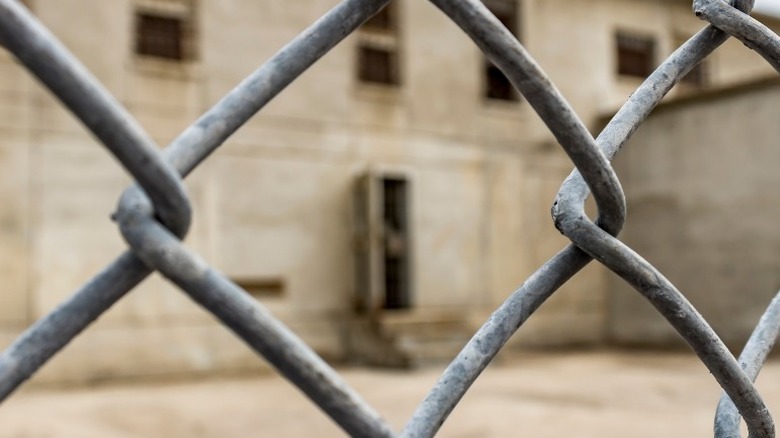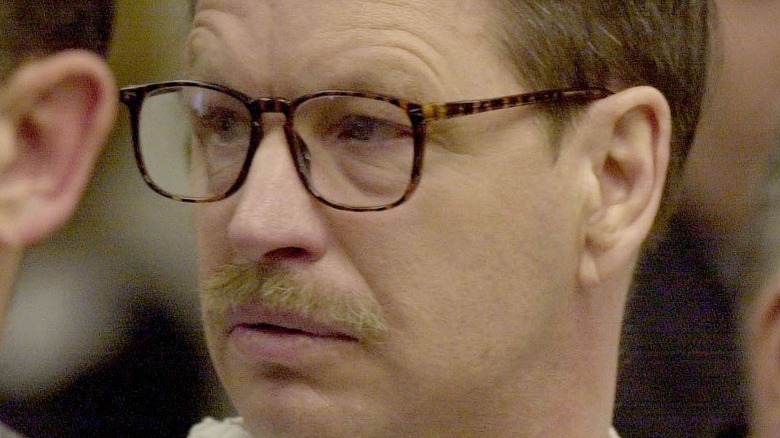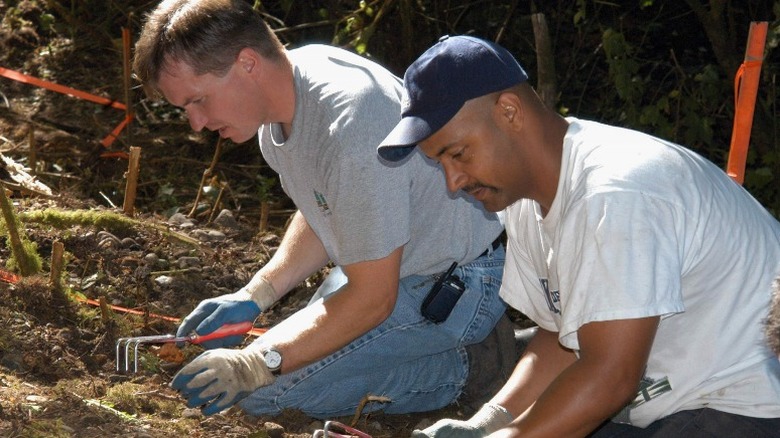This Is What Gary Ridgway's Life Is Really Like In Prison
The Green River Killer murder spree sent waves of fear throughout the state of Washington during the 1980s and 1990s. Dubbed "The Green River Killer," for decades before he was caught, Gary Ridgway didn't necessarily fit the profile of most serial killers. He was married, had a child from a previous marriage, and was gainfully employed (per Britannica). But throughout each of his three marriages, he was developing an insatiable sexual desire which grew to become dangerously coupled with intense religious convictions that led him to hate sex workers.
What culminated was a career killer who was eventually convicted of murdering 49 women and girls (via A&E). Responsible for perhaps as many as 80 murders, Ridgway was linked to his victims through DNA technology, a science that could have seen him convicted sooner if it would have been as readily available through the height of his murderous rampage.
The life Ridgway leads now is much different than that of the married factory worker from Seattle. Locked away for the rest of his years since being charged in 2001 (via Biography), Ridgway has had a good number of years to reflect on the pain and suffering he created for so many people.
Ridgway could have faced the death penalty
If it weren't for prosecutors striking a deal with Ridgway, he might not be alive in prison today. When arrested, Ridgway steadfastly denied having anything to do with the murders. Investigators years before had obtained a sample of his DNA when he had been linked to the death of a sex worker. According to Britannica, police noticed Ridgway with a prostitute in his pickup truck in the evening. Several nights later, the body of a prostitute was found near was he had been parking. At the time, DNA wasn't able to be linked through semen found on the victim, but that changed by the time investigators ran tests on the bodily fluids found on the remains of many unsolved Green River murders, directly linking them to Ridgway in 2001.
Confronted with this mound of evidence, Ridgway was given a choice; take his chances with a trial in which prosecutors would seek the death penalty, or plead guilty in exchange for his life being spared. Ridgway changed his mind about fighting the charges and took the deal.
Ridgway ultimately pled guilty to the murders of 48 women and girls, nearly all of them sex workers or runaways. In exchange for his guilty plea, Ridgway was given 48 consecutive life sentences without the possibility of parole. But that wasn't the end of it — Ridgway's victims continued to be found after his initial trial.
Ridgway is currently at the Washington State Penitentiary
Upon pleading guilty, Ridgway was transferred to the Washington State Penitentiary in Walla Walla, Washington. This would typically mean sharing a small cell with another inmate in ordinary circumstances. When cellmates are chosen by the administration, they take into consideration each inmate's criminal history, physical and mental health needs, work assignments, and other criteria (via Washington State Department of Corrections). The prison will not allow an inmate to select a cellmate but will consider changes if someone incarcerated has an issue with their current one.
Recreation time is given to inmates daily, they are fed in a mess hall, and they have the opportunity to work at various locations around the prison. This work is based on their ability, criminal history, and level of trust they've earned with the administration. While prison life is hard, there are at least opportunities for work and limited recreation that help to keep a person's mental health more intact, along with the ability to socialize with others — even in the most restrictive sense — human interaction is a key component to maintaining sanity. A hard life behind bars or not, Ridgway doesn't get to experience the typical prison life.
Ridgway is most likely in restrictive housing
Ridgway was big news nationally when he was brought to trial. After all, authorities had been trying to solve the Green River murders for over a decade, so Ridgway's arrest, trial, and sentencing made him a household name in the Pacific Northwest.
Because of this, Ridgway was easily noticed in the prison system by other inmates. His notoriety made him a target by other inmates, not minimized by the fact that it was possible that family members of some of his victims were incarcerated alongside him. Prison documents later revealed that because he was a target, his days alive were numbered if he were to be left in the general population (via The Seattle Times).
To spare Ridgway from being attacked and possibly murdered by his fellow inmates, he was placed in restrictive custody. A&E reported that he is most likely still in this type of prison custody today, isolated into a cell by himself most of the day with no interaction with other inmates.
According to the Washington State Department of Corrections, there are more than 150 inmates at the prison in Walla Walla in MAX Custody. While some are placed here for posing substantial risks to other inmates and staff, some get this type of housing to protect them from others. While this at one time meant zero contact with anyone, reforms in this state's prison system have been made over the years since Ridgway was first incarcerated.
Ridgway was at one time a transfer inmate at a Colorado prison
While it's not known if he participates, Ridgway would be encouraged to enroll in programs offered to MAX inmates, allowing him to have carefully supervised interactions with other inmates. Chess, creative writing, and other programs are offered, as well as therapeutic classes on anger management, wellness, and others. Inmates also have the opportunity to pursue adult education. Even with these programs, it's still a majority of time spent in solitary confinement. For that reason, officials transferred Ridgway to a Federal Max prison in Colorado in May 2015, where he wasn't widely known and could be part of the general population and not be constantly isolated (per Seattle Times).
In a move that cost nearly $20k, Ridgway was transferred out. A private plane was chartered to fly him there. But the public in Washington was outraged that the Green River Killer was getting a better life in prison than many thought he deserved. After all, he had taken dozens of innocent lives, and many felt he should have been sentenced to death. Law enforcement in particular was outraged, citing their need to have access to Ridgway as he was still a suspect in multiple unsolved murders.
The insistence of law enforcement in Washington led to Ridgway's stint in Colorado being a short one. In September 2015, he was flown back to Walla Walla where he remains to this day (via Kent Reporter).
Ridgway's victims are still being identified
According to Ridgway, he lost track of the number of women and girls he killed. Britannica reports that he stated in 2013 that he probably killed more than 80, even though he was initially convicted of 48. Claiming his hatred of prostitutes as his primary motive, Ridgway was bent on killing as many of them as possible. So how many more victims of the Green River Killer will be identified?
In December 2010, teens discovered the remains of Becky Marrero, a sex worker who had last been seen alive in 1982. Her body was discovered not far from where another of Ridgway's victims was disposed of. Authorities immediately tied him to this murder, hoping to close a missing person case that was nearly 30 years old (per Seattle Times). In court, Ridgway pled guilty to this murder and received an additional life sentence. Perhaps it's only a matter of time before more remains surface, tying Ridgway to yet another murder.





